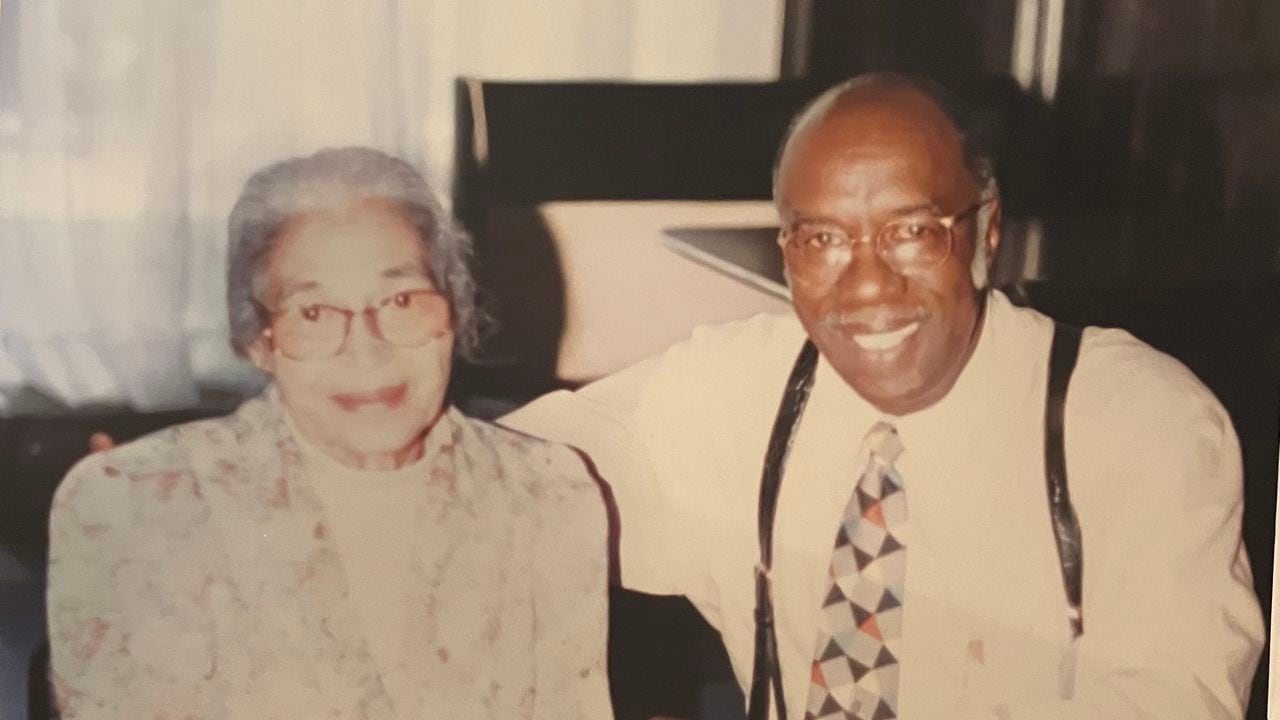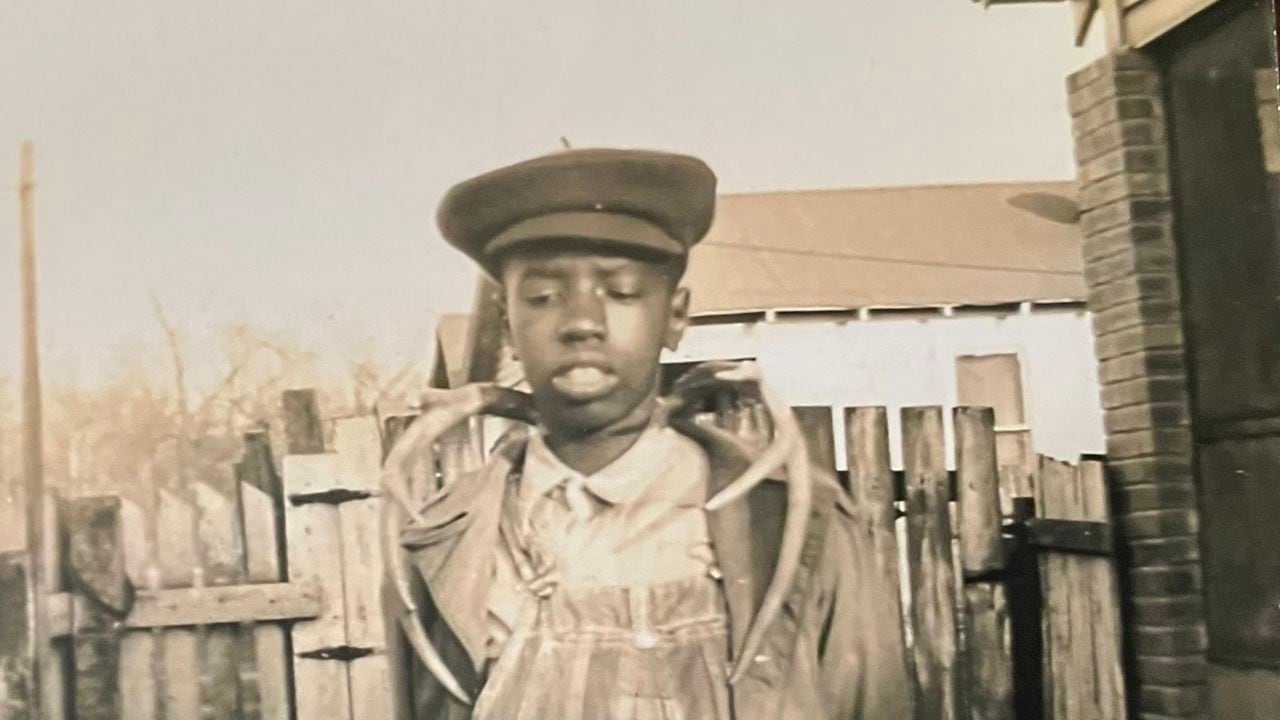Birminghamâs Shelley Stewart on turning strife into success: âIâm a Black man and proud of itâ
Shelley Stewart was born into a life of trouble turned into triumph, as he moved from being a homeless Black boy in the segregated South to an awarded changemaker.
At 89 years old, Stewart has countless stories to tell of his time spreading empowering messages in southern broadcasting booths, interviewing civil rights icons, starting a successful business, charitable foundation and podcast. Despite his triumphs, he said he still sees himself as the homeless little boy he used to be.
“I’m a Black man and proud of it,” Stewart said. “While people were telling me what I couldn’t be, I was telling them what I could be. They said I would never be worth anything, and I was telling them I could do it.”
Stewart was born Sept. 24, 1934 to Huell and Mattie C. Stewart. He was 5 years old when he and his brothers witnessed their father murder their mother with an ax. He went to live with relatives who were cruel and abusive.
Photo of Shelley Stewart as a young boy. After his father killed his mother, Stewart lived in a white family’s stable. Courtesy of Shelley Stewart.Shelley Stewart
By the age of 6, Stewart was homeless.
He survived by living in a white family’s stable from 1941 to 1948. His older brother, Jerome lived with him in the stable until 1943. The family’s only condition for Stewart to stay in the stable was for him to stay in school, igniting his lifelong love for education.
For the first 14 years of his life, Shelley Stewart was called by the wrong name, Shurley, and celebrated his birthday on the wrong day, Sept. 4, 1934, due to his father’s illiteracy.
“My father killed my mother, and he didn’t really know how to spell. He was illiterate. So he told the schoolteacher that my name was Shurley,” Stewart said. “Right on through elementary and middle school, no one knew my name, no one asked me who I was, where I came from.”
At Parker High School, the only Black high school in Birmingham at the time, Stewart was asked for a birth certificate to enroll.
He recalled going to the health department to find his birth certificate, and being told, for the first time in his life, that his name was Shelley Stewart and his birthday was Sept. 24.
“I was glad my name wasn’t Shurley anymore,” he said as he laughed.
In 1949, Stewart started his broadcast career when he was 16 at WEDR radio. He also worked for the Parker High School newspaper.
August 1951, after being separated for eight years, Stewart met with his brother Jerome who had enlisted into the Army.
“We hugged. We stayed up all night talking. He was saying that he knew where our father was and that our father didn’t want to speak to him. He found that my brothers, Samuel and David, were given away to plantation owners. And he still didn’t know my name was Shelley, not Shurley. He said, ‘listen Shurley, we’re going to find Samuel and David, I’m gonna come back and we will all be together,’” Stewart said.
Jerome left to fight in the Korean War the next day and was killed Nov. 6, 1951.
Against all odds, Stewart could read and write and graduated high school. And he was determined to do something with his voice.
After a stint in the military, Stewart bought a home and returned to work at WEDR radio where he became a popular radio personality known as Shelley the Playboy. He said he was able to become “the playboy” because he was sharp, could put on a front and make people laugh.
He laughed as he sang a tune, “get ready, here comes Shelley, he’s a playboy, he’s my boy.”
“Shelley Stewart, turned into Shelley the Playboy, which turned into Dr. Shelley Stewart. But I’ve always been that same little guy, street kid, homeless kid. I’m just a plain, homeless kid that’s been blessed,” he said.
Stewart later became one of the nation’s first Black radio station owners.
“My intent was never to be a disc jockey. I really just wanted to get the message across that, ‘you can.’ I always wanted to make things better for me and make things better for others,” Stewart said. “Black folks and white folks listened to what I had to say. And I was saying things like ‘get your butt in school, get your education.’”
Stewart said his success as a radio personality was the result of the empowering messages he spread on air about the importance of education and equality.
His positive messages attracted the attention of Edward Gardner, president of the Alabama Christian Movement for Human Rights, and Fred Shuttlesworth, one of the most noted civil rights leaders of the South.
“I became more of a messenger to the community. I would get on the air from Birmingham to Alexander City, Alabama. I was heard in every community. I was there on the front porches, I was in the fish fries, I was in the churches. I was a mass communicator, not a class communicator. I was able to advocate for education,” Stewart said.
Stewart’s efforts did not go without consequence. In May 1958, someone vandalized the WEDR radio station, spray painting KKK all over the building.
Stewart pulled a copy of the original newspaper clipping out of a worn brown leather bag under his desk and pointed to the photo of himself cleaning the hatred off the wall.
The report said the building’s engineers found dead dogs with their throats cut at the base of the tower several times. More threats followed. Someone cut the support cables on the radio tower.
“They cut down that radio tower because of me, because I was bringing people together,” Stewart said.
Despite the setbacks, Stewart did not quit. In the 1960s, Stewart worked for WENN-AM radio where he was widely known as the on-air voice of the Civil Rights Movement in Birmingham.

Photo of Shelley Stewart with Rosa Parks. Courtesy of Shelley Stewart.Shelley Stewart
Then, in 1967, he co-founded Steiner Advertising, now known as O2ideas. In the company’s early years, Stewart did not want his clients to know a Black man was running the business, so he let his white business partner, Cy Steiner, lead interactions with clients and sign contracts.
Over the years, he worked with brands like Pepsi Cola and Honda and was the public relations director for singer Otis Redding.
“My company is 56 years old now, one of the oldest advertising companies in the state of Alabama,” Stewart said. “I was known for going into corporate meetings and saying ‘I don’t want to continue being the only Black man here.’ I didn’t pride myself on being the only Black man at the table.”
He continued working in local radio, too; eventually, he and his business partner, Erskine Faush, bought WATV-AM, which became the most popular radio station in Birmingham.
Stewart retired in 2002, but decided his work was not done. He wrote two books, “The Road South: A Memoir,” in 2002, and “Mattie C.’s Boy: The Shelley Stewart Story,” in 2013, telling the story of his life and how he persevered.
In 2007, he founded the Mattie C. Stewart Foundation in an effort to increase the graduation rate of high school students, a cause that remains close to his heart.
Today, he sits in his office, on a quiet, peaceful plot of land in Sterrett. A large framed photo of his mother hangs in the entrance. His office walls are lined with books, awards and plaques: The Rosa Parks Award, Warner Bros. Records Living Legend award, a Coca-Cola Bottling Company plaque naming Stewart one of the top 10 most-recognized African Americans in Alabama, the Southern Poverty Law Center lifetime achievement award.
Pulled from a worn leather bag are an array of photos where he sits among icons: Rosa Parks, Al Sharpton, John Lewis, Jimmy Carter, James Brown and Gladys Knight.
He recalls a conversation where James Brown called Stewart “the mouth of the south.”
His favorite photo, he said, was one of him sitting among prison inmates after talking to them about the importance of education.
“It’s not the big shots, it’s the ordinary people. It’s those people who made me what I am today,” Stewart said. “It’s not the awards, I’ve got them by the hundreds. It’s the work that I’ve done that matters. That’s me.”
Among his lifetime of work and service, one of his proudest achievements is his new podcast, which he records in a small unit behind his home.
He has more than 3,000 recorded interviews from years of radio work, which feed into his podcast.
On Shelley’s Plumbline, he releases decades-old interviews with guest speakers, including music icons and friends Sam Cooke and B.B. King; civil rights foot soldiers like Tommy Wren and Yvonne Turner; and icons like Johnny Ford, the first Black mayor of Tuskegee, and Vincent Harding, a civil rights activist. Stewart and guests discuss social topics that are as relevant today as they were 65 years ago.
Decades after he left regular radio hosting, Stewart is still spreading positive and empowering messages to his listeners. He encourages viewers to love themselves, stay in school and vote.
His voice is smooth, lively and confident. Listeners can hear how he earned the title “Shelley the Playboy” in his early years. He laughs boldly, tickled by the memories of his countless interviews. He excitedly talks about his guests as if they are best friends.
“The struggle continues now. Now we must all realize that in life, love is the key,” Stewart said in his podcast.
While playing one of his podcast’s latest episodes, he sang along to Lou Rawls, a gospel singer, tapping his toes, his arms raised in the air, glasses in hand. The episode discussed the beauty of perseverance, love and faith.
“I want my story to tell people that they can come from that, from so little. I want the young people to know that education is the key. I want them to know that they can do better,” Stewart said. “Across decades we have accomplished great things, but the struggle continues. Don’t go backwards. I want young people to connect the old with the new, value the past and their own futures.”
